

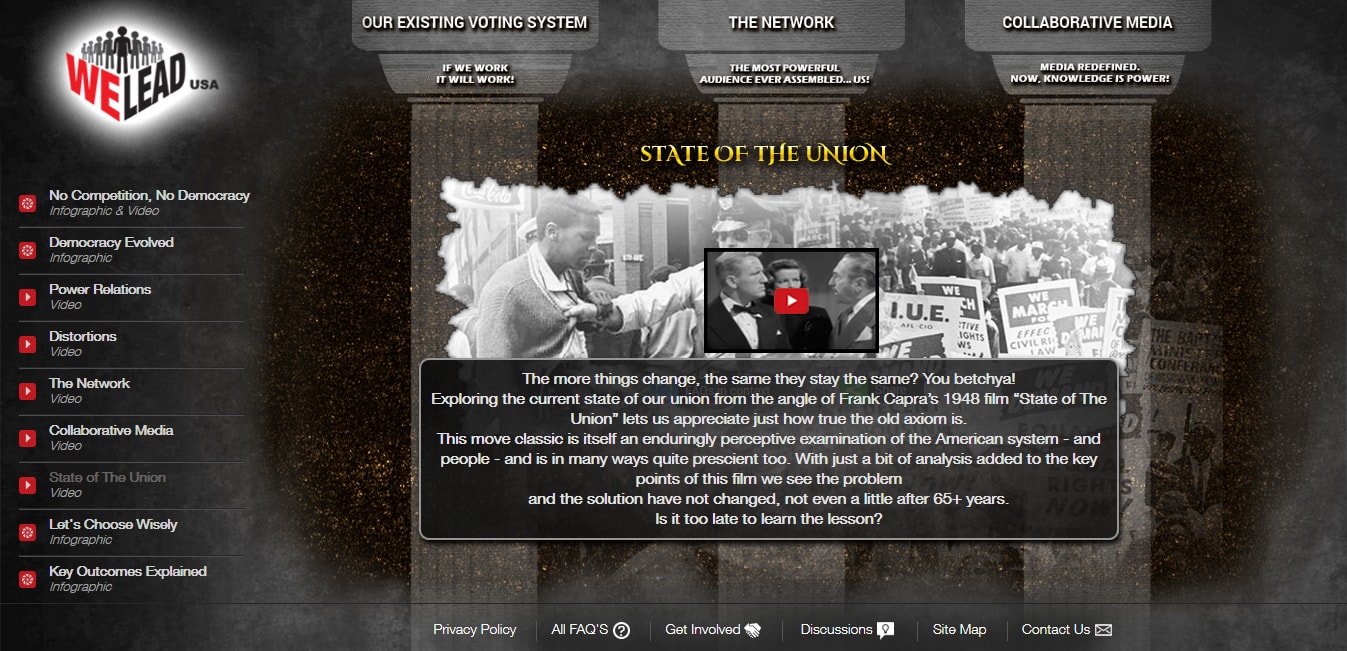
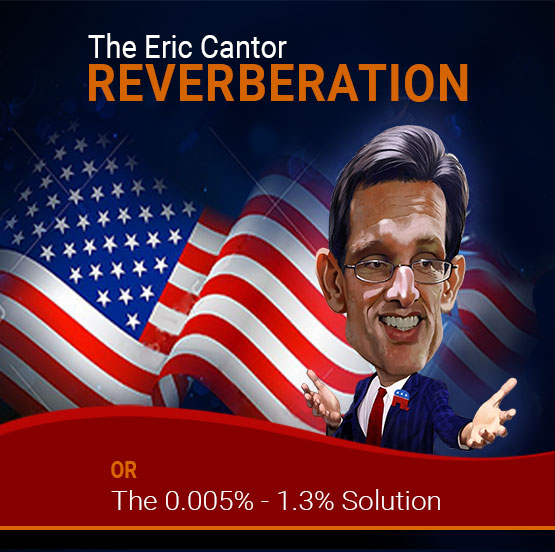
The Eric Cantor
Reverberation
Or
The 0.005%-1.3% Solution
Copyright 2016 by WeleadUSA
All Rights Reserved
![]()

Although two years removed from the time of this writing, we would do well to remember that in June 2014 we had one of the biggest upsets in American political history when Eric Cantor, then House majority leader, considered next-in-line to be House speaker and third in line to the presidency, lost his Republican Primary by double digits to David Brat!
Now U.S. representative Brat was then an unknown college professor who Cantor had heavily outspent. Despite poll numbers showing the incumbent with a 34-point lead over his rival, Cantor became the first majority leader to lose a primary in 115 years.

This event of course became great grist for our distraction-mill with much energy devoted to establishing the ultimate cause and the “inner-meaning” of this supposedly seismic upset.
After all, this isn’t supposed to happen! Incumbents rarely lose their bid for re-nomination in primary elections, or general elections for that matter, and the 2014 cycle was a continuation; a classic example of the profound lack of competition – and usefulness – in our nominating, and overall electoral system. No wonder the shock!
Holding true to form, the 2014 primaries for congressional races saw only four (4) U.S. representatives lose (none in the senate); less than 1%, of all members. At the state and local level we can only image how low it goes; Fuhgeddaboudit!
In the analysis of this defeat that followed- more in the category of handwringing – our punditry and their “political junkies” focused heavily on the money-media-election complex inside-game of hot button issues and questions of political maneuverings;
Questions of intrigues, mistakes, lessons and portends surged through the media-sector of the complex as they struggled to make sense of it all; poor dears!
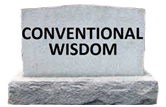
These postmortems of Mr. Cantor’s defeat seemed to focus on a narrative that stressed that elite point of view; perhaps to evade discussion of a simpler possibility. That being Americans, in this case Virginians, as independent agents, took conscious action to remove a representative with whom they were unhappy within a system designed specifically for that action to be taken.
This system of primary elections – unique to the United States – for party nominations, to first stand for office, was not mandated by our Constitution. It emerged from our modern concept of constitutional government; that powers are conferred by the consent of the governed and that consent – or possible repudiation– should be regularly expressed and ultimately decided at an election.
The open ballot access and primary voting reforms were instituted more than 120 years after we got started as it became clear that our closed party “single election” system was so mired in corruption that it could no longer be trusted, and therefore the consent illusory.
 The purpose of a preliminary nominating election was to create proximity to and control over our elected officials and public sphere. This because the American system of politics that developed – however unforeseen – made it certain that allegiance would be owed to those who control access to the ballot and nominate; an inescapable consequence of our expansive democratic expression. These reforms acknowledged that certainty and represented an attempt to give its citizens power over any machinery that might be working behind the curtain.
The purpose of a preliminary nominating election was to create proximity to and control over our elected officials and public sphere. This because the American system of politics that developed – however unforeseen – made it certain that allegiance would be owed to those who control access to the ballot and nominate; an inescapable consequence of our expansive democratic expression. These reforms acknowledged that certainty and represented an attempt to give its citizens power over any machinery that might be working behind the curtain.
These reforms were eventually adopted in all 50 states and perhaps (not perhaps, definitely) represents the most sensible, straightforward, and powerful democratic reform effort ever conceived.
Many other aspects of our civic structure – like political parties – were not mandated by our Constitution either (on the contrary, the framework of the constitution was designed to discourage the rise of powerful political parties) but evolved over time as an unplanned expression and byproduct of a consensual, and evolving, democratic process. Therefore it should come as no surprise that, on occasion, the people – without any help from above – might use the tools at their disposal for the purposes intended!
That is, they would openly and consciously act to grant or deny a seat of authority to an elected official based on their own judgment and observations!
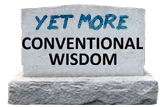
That shock would be the result of such an event should be telling in and of itself; the misdirection worked.
Missing the point completely, more and more Americans have come to condemn their electoral system as “rigged” and irrelevant, a side show staged for entertainment purposes; the results predetermined.
Is this belief accurate?
Well, Mr. Cantor’s re-nomination/election would have played perfectly in to this point of view as he did outspend his opponent 20-to-1 and the seat he occupies is safe for his party. Money and redistricting rules our politics, doesn’t it? As a major figure in his party he had all the name recognition, media attention, and high profile that bodyguards and hobnobbing at Davos could buy. Can’t lose, right?
Locally, he had power to “deliver” for his district and being seen as next in line for speaker would have meant even more power and prestige for that district; even better, no?
But the events did not play out to script!
What then does this tell us about the perception, now pretty much the prevailing conventional wisdom, that our electoral process is rigged and irrelevant?
Well, using a casino analogy we can say rigged is loaded dice. In an election it would mean a stuffed ballot box or a hacked voting machine with no paper trail. Rigged means you can’t win! On the other hand, in the casino, gamed is being plied with alcohol, distracted by cocktail waitresses, and being denied easy access to a clock. In an election, gamed means using confusion and a manufactured disdain for the process and applying that to an illusion – a good one – that competition and communications are controlled and beyond the reach of the citizen-voter.
 In fairness however, you cannot say that a process is rigged because you do not participate, understand, or play the game shrewdly!
In fairness however, you cannot say that a process is rigged because you do not participate, understand, or play the game shrewdly!
Consider the people of Hong Kong. Activists there courted great danger by agitating for exactly the nominating mechanism that was the means for Virginians to remove a powerful figure like Cantor. They understood; without this power elections are rigged and irrelevant.
Therefore, with this is authority available to Americans – yet effectively squandered for over a century – proposing this as a rigged/irrelevant system is not only wrong, it qualifies as psychological warfare. A struggle we help to perpetuate and wage on ourselves.
However unusual, Mr. Cantor’s example should make this truth crystal clear; the American system is ultimately owned by her people – if and when they show up.
Why then wasn’t the “shocking” defeat of one of our most prominent national political figures a “wake-up” call to a wise people for the strategic use of this power? That is a good question for the many crusading truthers of our media multiplex but, since they are asleep, let’s take a crack at it here by digging deeper in to the moribund state of our electoral system and our part in its making;
 All these factors no doubt hinder sophisticated engagement and therefore do “game the system” with controls and distractions into a very relevant irrelevance.
All these factors no doubt hinder sophisticated engagement and therefore do “game the system” with controls and distractions into a very relevant irrelevance.
The real problem is that these discontents are not driving strategic minds to see the dots not being connected!
The fault lies not in the stars…

If nature abhors a vacuum imagine how power feels!
Playing the game of power seems fundamental to human nature so it should come as no surprise that our absence from, and ignorance of the power centers in our system leaves a vacuum to be filled by those seeking superiority and control- and are willing to work at it.
Since the unlikely effort to make the people preeminent – potentially – by making their votes strategic and decisive, was successful, it is interesting to contemplate why after more than a century of operations our system of open ballot access and primary voting remains a mystery to its people; but not to the people of Hong Kong!
After all, this process is the foundation of the system that determines who will hold the elected seats of authority -everywhere – in our country and its centrality to our civic infrastructure is unambiguous; everything flows from it! The age of partisan redistricting intensifies those dynamics but, regardless of how districts are drawn, this would still remain the case.
 Civic affairs are driven to even greater depths when electoral gaming meets other key civic processes; like our system of endless laws and lawmaking. As matters well below our radar and a self-imposed electoral IGNORE-ANCE combine; we become lost!
Civic affairs are driven to even greater depths when electoral gaming meets other key civic processes; like our system of endless laws and lawmaking. As matters well below our radar and a self-imposed electoral IGNORE-ANCE combine; we become lost!
The muddled and deceptive environment of law-making saturates our lives yet few – them or us – know anything about it. Nonetheless, this domain remains unquestioned as the foremost pillar of our civic lives. It features;
This is the ecosystem of citizenship in which we operate. It makes the relationship between a position any candidate takes and the votes – any
vote – their constituents cast pretty much irrelevant and does therefore lend credence to that charge. The dependable failure of the people to “keep up” creates a deadly combination that has emboldened the complex toward more overt rigging; so in this regard the alarm is warranted- however one-dimensional.

Here the consideration of Eric Cantors defeat leads to logical and crucial questions;
This defeat of the prominent, powerful Mr. Cantor is quite instructive because if we accept that it was a byproduct of that unplanned expression and consensual democratic process, we can see that there is nothing fundamentally wrong with our political or electoral system other than – from the people’s standpoint – it’s, well, too darn unplanned!
Clearly, our system is not so irrelevant and rigged as it undeniably endows its non-insider citizens with many powers and benefits; potentially! Potentially!

 However, that such a political upset is presented as something so rare and shocking- and then left at that should serve to tell us the problem is ours. Our media has failed us, our would-be activist saviors have failed us and we have failed us. We have not demanded enough of those who choose to speak publicly; we have not talked to each other enough, or sought the necessary strategy and tools.
However, that such a political upset is presented as something so rare and shocking- and then left at that should serve to tell us the problem is ours. Our media has failed us, our would-be activist saviors have failed us and we have failed us. We have not demanded enough of those who choose to speak publicly; we have not talked to each other enough, or sought the necessary strategy and tools.
We just have not looked hard enough! Instead, and unwisely, we continually fall back on the same failed methods, mindsets and people.
Clearly, it is only our absence – in all its facets – that creates the vacuum the forces of “insiderism” fill.
Let’s do the examination of this race that should have been done and see where these questions lead.
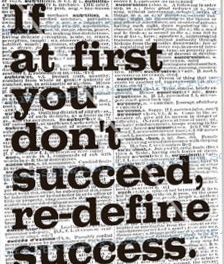
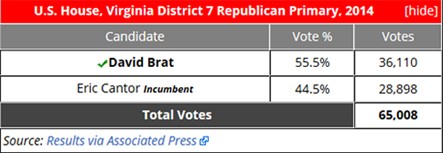
Voter turnout
The dissection oriented question asks if the increase of voter turnout in this Republican primary resulted in Cantor’s defeat.
Previous cycle
In 2012, 47,037 votes were cast in a “contested” (opposing name on the ballot) yet “uncompetitive” (60+% margin of victory) district 7 primary which Mr. Cantor carried with 79% of the vote.*
This compared to the 65,008 votes cast in this June 10, 2014 primary; an increase of 38.2 percent. But, this increase in turnout might just be part of an unplanned expression – of discontent – and is not really the real story here.
Closer to, but still not the real story
 In district 7, with a population of over 750,000 the 65,000 votes cast represented a turnout of a paltry 9%. However, the more relevant metric would be an estimate based on the voter eligible population (VEP); within this district, likely in the range of some 530,000. That would mean only a slightly less paltry turnout of some 12%.
In district 7, with a population of over 750,000 the 65,000 votes cast represented a turnout of a paltry 9%. However, the more relevant metric would be an estimate based on the voter eligible population (VEP); within this district, likely in the range of some 530,000. That would mean only a slightly less paltry turnout of some 12%.
 Both metrics – in their smallishness – and despite the increase from the 2012 cycle, are representative of the country as a whole in that they hardly represent a robust turnout in THE elections that determine so much; that is, when there even are such elections; but that is another story!
Both metrics – in their smallishness – and despite the increase from the 2012 cycle, are representative of the country as a whole in that they hardly represent a robust turnout in THE elections that determine so much; that is, when there even are such elections; but that is another story!
 It is most unfortunate that it’s the complex quantitative characteristics of important matters that always draw the attention of our media and academic analysts. Seduced by the certainty (and authority) the numbers promise, they are followed; despite early and regular admissions they are faulty, incomplete, and no more than just part of a whole. This is true even when very small populations and very limited subject matter is examined- like the defeat of a House member in a primary. The cost of this myopia is very high because we not only lose sight of the things that numbers cannot tell us, but also of the more simple things they can!
It is most unfortunate that it’s the complex quantitative characteristics of important matters that always draw the attention of our media and academic analysts. Seduced by the certainty (and authority) the numbers promise, they are followed; despite early and regular admissions they are faulty, incomplete, and no more than just part of a whole. This is true even when very small populations and very limited subject matter is examined- like the defeat of a House member in a primary. The cost of this myopia is very high because we not only lose sight of the things that numbers cannot tell us, but also of the more simple things they can!
In this case, focus on the quantitative – turnout or percentage increases or decreases alone – distracts us from the very much more important qualitative focus on the significance and power of even a small number of nominating, primary votes –i.e. voters.
That is the real story!
*Less than 60% is an arbitrary margin of victory –assigned by the political science community – necessary to a designation of ‘competitive’ i.e. 59% or less margin of victory = competitive; 60% or more =Not Competitive

The Primary vs. the General election
The 65,008 that turned out in the 2014 primary that sent Mr. Cantor packing represented only a quarter of the November general election turnout of 243,000 voters that ultimately sent Dave Brat to the U.S. House of Representatives.
But, given that this district was considered solidly Republican and that the Republican nominee was overwhelmingly favored to win the general election- and did (with 60.8%) – which electoral population was decisive in sending Dave Brat to the House of Representatives?
 Was it the 243,000 (45% of VEP) November general election voters? – Weeellll; it was from this group that he was “officially” sent to the U.S. House of representatives.
Was it the 243,000 (45% of VEP) November general election voters? – Weeellll; it was from this group that he was “officially” sent to the U.S. House of representatives.
 Was it the 65,008 June (Republican/Open) primary voters (12% of VEP) that really made the decision? – Well yes, because this district was electing a Republican; there was no question about that!
Was it the 65,008 June (Republican/Open) primary voters (12% of VEP) that really made the decision? – Well yes, because this district was electing a Republican; there was no question about that!
But
Note Brat’s “double-digit” margin in his victory over Cantor. Note also that the double digits so much were made of total just 7,200 votes. 11% doesn’t seem so much of a landslide victory when you boil it down to 7,200 individuals; in a population of some 530,000, does it?
The True Deciders
7,200 – That number of votes/voters/actual real people; only 1.3% of the VEP, were the true deciders here.
Not sixty percent’s, not eleven percent’s; 1.3% of the voter eligible population…of a congressional district!
The next largest district after that is an entire state–and the next smallest?
What percentage would be decisive in an election for a local or county office; 0.65%, 0.32%?
True Power
 The stolid and too often silly quantitative approach of “how much” cannot connect dots to tell you why, or how. This tiny percentage of Virginia’s 7th district voter eligible population – in however much an unplanned, unconscious,
The stolid and too often silly quantitative approach of “how much” cannot connect dots to tell you why, or how. This tiny percentage of Virginia’s 7th district voter eligible population – in however much an unplanned, unconscious,
non-strategic manner – removed one of the most powerful, high profile politicians in the country and nothing stopped it!
However, to exercise that authority required a combination, a fusion;
That same number – or even one much greater – would have little sway in the general election because it’s already as predetermined as these things can be that a republican would hold the seat. So, if the population isn’t organized, and understood as nominators – the power is lost.
Makes one wonder; what if such power became planned, conscious and strategic.

These dynamics notwithstanding, we have a system that is gamed and in danger of worse; no question.
That game is meant to dampen electoral competition in order that the entirety of our electoral system should be rendered useless as the medium it was naturally meant, and required to be. The Eternal vigilance that self-government requires ultimately means enforcement – which can only be properly expressed at an election.
However, if that electoral authority is limited to and expressed only on an Election Day, and an electoral landscape –capable of executing a holistic eternal vigilance – is never considered, much less sought, then yes, this is all nothing but a rigged game.
Considered from another, less defeatist and more strategic angle however – and in light of the facts of the Cantor defeat – we do learn quite a bit about the game and the vital importance and potential vitality of voting in our system.
 The key here is the actual control of competition while at the same time controlling our perception of it. On one hand elections could be deemed “divisive” and therefore undesirable. It might be suggested we get rid of them; a radical and dangerous step. On the other, divisions are quite beneficial to those who rule as are the illusions and narratives they support.
The key here is the actual control of competition while at the same time controlling our perception of it. On one hand elections could be deemed “divisive” and therefore undesirable. It might be suggested we get rid of them; a radical and dangerous step. On the other, divisions are quite beneficial to those who rule as are the illusions and narratives they support.
So, why not manage outcomes very astutely while encouraging discouragement; just let differing perceptions do the work of dividing. For example:
Amongst the people – there is the growing public disdain for voting that is showing up in these three ways;
With no alternative it’s a losing proposition every which way…unless all you aim for is complaint!
As for the established order – public suffrage has historically, and does still focus on;
 It’s a very clever approach but considering it carefully leaves us with an irreconcilable difference.
It’s a very clever approach but considering it carefully leaves us with an irreconcilable difference.
If we claim voting doesn’t matter; Not 243,000 votes, Not 65,000, Not 7,200, what would Eric Cantor, or for that matter now U.S. Rep. Dave Brat (R-Virginia) say?
If we claim voting is irrelevant, then how could we explain why “power elites” bother to game what doesn’t matter? By what reasoning could one deem something “irrelevant” that so much is invested in?
Here we can make this attempt to reconcile;
All the players know that with no meaningful competition there can be no genuine democracy/republic! Without it, the people’s ability to understand and control their government, and with it their lives, is beyond reach!
 The controllers know the indispensable tool of electoral competition, bent to its own will/use, can be used as a cudgel. If anyone wants to speak out, they will be alone, and targeted for defeat within the ballot access/nominating process. This ensures loyalty, acquiescence, and the control of potential apostates within, while maintaining a false reality without.
The controllers know the indispensable tool of electoral competition, bent to its own will/use, can be used as a cudgel. If anyone wants to speak out, they will be alone, and targeted for defeat within the ballot access/nominating process. This ensures loyalty, acquiescence, and the control of potential apostates within, while maintaining a false reality without.
The totality of all this makes clear exactly what lever of power we must wrest control of. Perceptions must change so allegiances can change! Allegiance in our system is owed to those who nominate and as it stands that is NOT the capable people.
This is both the lynchpin and soft underbelly; the opportunity.
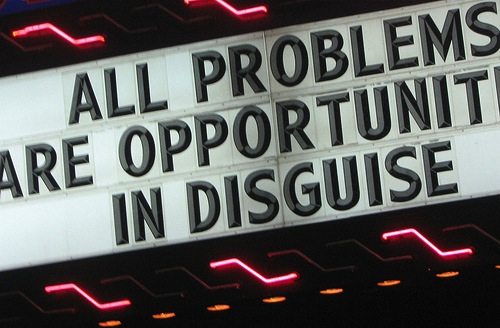

Now the question becomes; what can be done with all this?
If by now you have reviewed enough of the material that explains the dynamics and underpinnings that have just been summarized here, perhaps the picture is clarifying as to how the opportunity can be capitalized on.
The Citizens Access Network now takes the stage as the enabling mechanism of a genuine solution.
 Imagine; 400 M.P.G. and 0-60 in 4 seconds
Imagine; 400 M.P.G. and 0-60 in 4 seconds

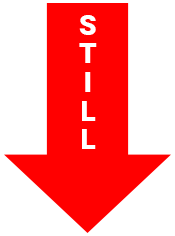
Bottom Line
Only 1.3% – and certainly less – of a voting eligible population – at the largest district level; congressional – are proven decisive and so cannot be trifled with; many dynamics are thus created!
Now, imagine the affects;


If we show up, so will everyone else!
Now, let’s consider what could, and very likely would, result from all this. As demonstrated by the Citizens Access Network display, it is a relatively simple matter to leverage the organic design of our country into a network purposed to capture its deep organization and reach. Using the tools of the network, we are free to develop innovative mediums, process input and seek answers and solutions to any and all issues.
With this network – fused to the power we own as citizens – no subject would be beyond the reach of the people and their representatives to explore, and no problem beyond solving.
Capable of affecting decision making at all levels, we transform our anemic, artificial, election day into an electoral landscape capable of delivering true self-government.
 The fusing of the two pillars – this network to our existing voting system – creates a third; a new form of media – genuine collaborative media. This form of media will be wholly different in nature from any other that has existed; because, by design, it will be tethered to powerful civic deliberation and action.
The fusing of the two pillars – this network to our existing voting system – creates a third; a new form of media – genuine collaborative media. This form of media will be wholly different in nature from any other that has existed; because, by design, it will be tethered to powerful civic deliberation and action.
Essential information and learning systems; i.e. knowledge, must be translatable into traction and action; absent that capacity nothing can succeed!
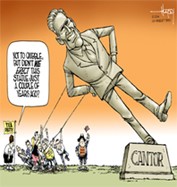
The founders, whether federalist or anti federalist, agreed and often stated – in one way or another – that the framework they created demanded advanced citizenship of its people; they’d have to want it.
Realistically of course, it could be no other way!
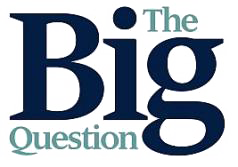 However, the form or expression of that advanced citizenship must meet the era; its challenges, sensibilities and the opportunities that will present themselves. As we come to another crossroads, in another time, our time, will we demand that we build on the advanced citizenship that came before; to not only preserve, protect and defend, but to also evolve?
However, the form or expression of that advanced citizenship must meet the era; its challenges, sensibilities and the opportunities that will present themselves. As we come to another crossroads, in another time, our time, will we demand that we build on the advanced citizenship that came before; to not only preserve, protect and defend, but to also evolve?
Is it now clear that the bar we’ve established for feasibility, coherence, and power can be met? Is it now clear how this single example – this one unexpected political event – brings into focus the rich potential for solving and evolving – with no dependence
whatsoever on all the remote, complex remedies we’re always told will be necessary.
The right lesson to learn from Eric Cantor’s defeat is that our system can work! However, the rarity of, and shock attached to, what should otherwise be a routine event – of incumbent politicians facing competition, and maybe even losing – tells us that we have misused and misunderstood our systems most vital powers. This is an epic failure of imagination and organization; a very poor performance indeed, particularly in our age of modern communications and saturation media, with the immeasurable innovation of the Internet at its heart.
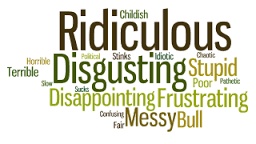 As pointed out here elsewhere and often; no challenge we face can be met with the capable people lacking for organization and planning. Ignoring that simple truth would be like expecting a commercial enterprise to be successful in the absence of robust management or for freedom to reign in the absence of eternally vigilant citizens; how could such things ever be?
As pointed out here elsewhere and often; no challenge we face can be met with the capable people lacking for organization and planning. Ignoring that simple truth would be like expecting a commercial enterprise to be successful in the absence of robust management or for freedom to reign in the absence of eternally vigilant citizens; how could such things ever be?
Would any sports fan accept the coach of their team having no plan for how their players will be used? Would any fan accept a coach who met his opponent on the field of play with no preparation, no idea of his rivals strategy or tactics? Would any fan accept a coach who had his players watch film incessantly but make no attempt to practice, plan or act on what was learned? What is the expectation; just show up and ask your opponent to forfeit?
This sounds ridiculous but it’s exactly what the capable people of this country do; make no mistake, exactly!
The first step in changing this must be to acknowledge that our unchanging approaches have not been working AND acknowledge that an alternative to continuing these fiascoes does exist.
If we fail to do this, what are we saying?

 If we are to get from “here to there”, we must do it with our votes; there is no alternative. But as we can plainly see, that vote has vast implications that have been vastly misjudged. There are too many things we have been reluctant to consider preferring instead the habitual non-strategy of hasty reaction and emotion. We have also been badly advised by the “voices of change” in our public sphere and have not held them to account!
If we are to get from “here to there”, we must do it with our votes; there is no alternative. But as we can plainly see, that vote has vast implications that have been vastly misjudged. There are too many things we have been reluctant to consider preferring instead the habitual non-strategy of hasty reaction and emotion. We have also been badly advised by the “voices of change” in our public sphere and have not held them to account!
All these factors we must take stock of, we must think. The destinies of a people are determined by their character; not their governments and certainly not their public intellectuals!
Therefore, if we are to get out of this, we must look to what was best in us and likely it’s more than enough; if it gets organized!!
Building up – not tearing down – the oldest and most successful democratic framework is the only way out; and the only way forward. We mustn’t allow ourselves to be sold a bill of goods demanding unity or touting grand bargains; that’s a trap! We should insist on ground up solutions born of settlement, flexible coalitions, study, and dialogue; realistic measures exercised in an environment of our own creation.
The fusion of the Citizen’s Access Network to the strategic use of our existing voting system makes this more than possible. Moreover, it will make advanced citizenship easy; but not free!
As to Eric Cantor and the lessons his political career offers, we owe him a debt of gratitude.
If we are willing to accept it, this is notice being served – a wakeup call being made – that tells us every elected official, at all levels of government – county official to president of the United States – all, are subject to the ballot access/nominating process and that this is the foundation of our electoral system and democratic infrastructure. Without these features there would be no “truth” to our democratic–republic, but it does exist, it is true, AND, it is ours.
 Starting there and adding just a wee bit of imagination and industry, reinvigorating our unique form of representative democracy would be highly effective, inexpensive in every way, and great fun.
Starting there and adding just a wee bit of imagination and industry, reinvigorating our unique form of representative democracy would be highly effective, inexpensive in every way, and great fun.
All these factors we must take stock of, we must think. The destinies of a people are determined
by their character; not their governments and certainly not their public intellectuals!
